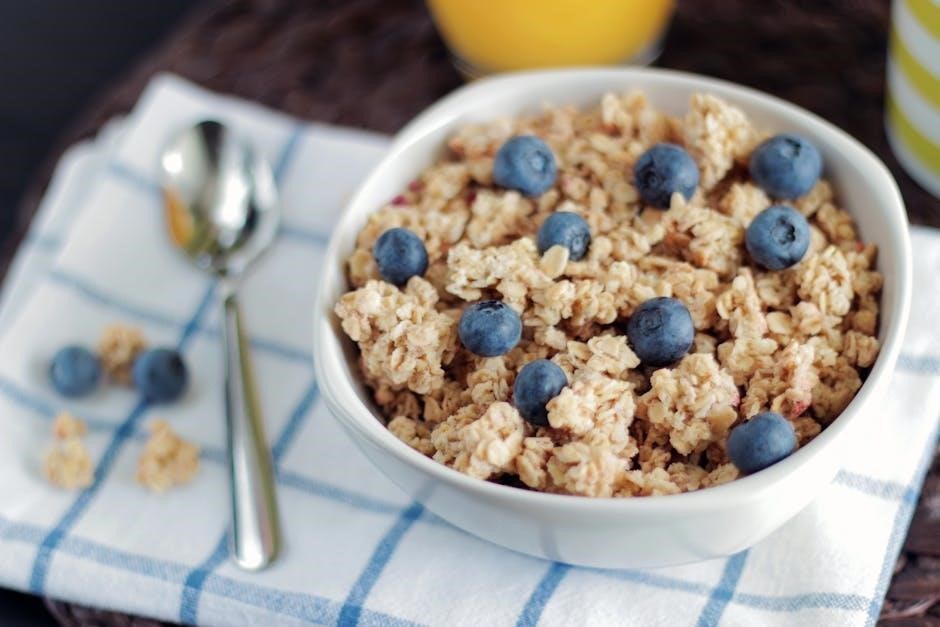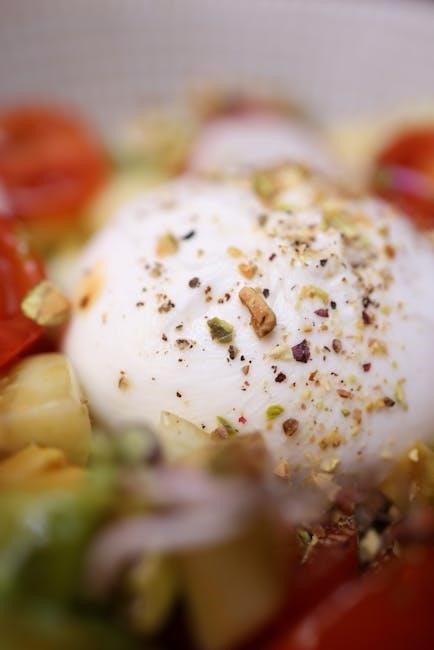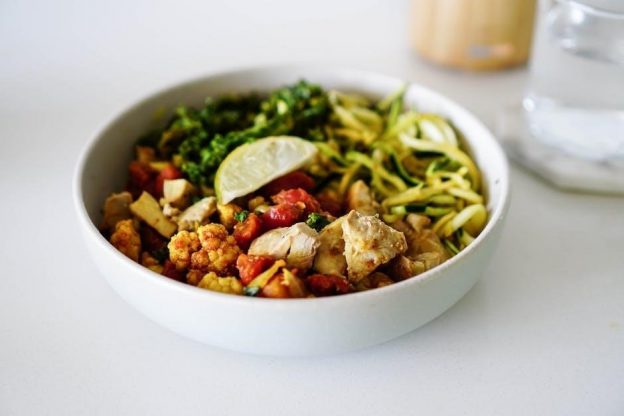This 7-day vegetarian keto meal plan offers a structured approach to weight loss and improved metabolism, combining high-fat, low-carb, meat-free meals for sustained energy and vitality.
Understanding the Vegetarian Keto Diet
A vegetarian keto diet combines plant-based eating with high-fat, low-carb principles, avoiding meat while emphasizing foods like avocado, nuts, and low-carb vegetables for weight loss and energy.
What is the Vegetarian Keto Diet?
The vegetarian keto diet is a dietary approach that combines plant-based eating with ketogenic principles. It focuses on high-fat, low-carbohydrate meals, avoiding meat and fish. This diet emphasizes foods like avocado, nuts, seeds, eggs, and low-carb vegetables, providing a balanced and sustainable way to achieve ketosis. By eliminating meat and focusing on plant-based sources of fat and protein, it offers a unique alternative to traditional keto diets, appealing to those who prefer vegetarian lifestyles while seeking weight loss and improved health benefits.
Benefits of a Vegetarian Keto Diet
A vegetarian keto diet offers numerous benefits, including weight loss, improved metabolism, and enhanced energy levels. It promotes fat burning, reducing reliance on carbohydrates, and supports blood sugar regulation. This diet also fosters improved mental clarity and reduces inflammation, contributing to overall well-being. By focusing on plant-based, high-fat foods, it encourages sustainable eating habits and can lower cholesterol levels. Additionally, it supports environmental sustainability by minimizing meat consumption, making it a holistic choice for health-conscious individuals seeking a balanced, meat-free lifestyle.
Key Principles of the Vegetarian Keto Diet
The vegetarian keto diet revolves around high-fat, low-carbohydrate, and moderate-protein intake, typically limiting carbs to 20-50 grams daily. It emphasizes plant-based fats like avocados, nuts, and seeds, while avoiding sugary and starchy foods. Protein sources include eggs, tofu, and dairy, ensuring adequate nutrition. Meal planning focuses on whole, unprocessed foods to maintain ketosis, the metabolic state where the body burns fat for energy. Proper hydration and macronutrient balance are essential to avoid keto flu and optimize results, making this diet both effective and sustainable for meat-free lifestyles.

7-Day Vegetarian Keto Meal Plan Overview
This meal plan provides a structured, low-carb, high-fat approach, featuring plant-based proteins and healthy fats to promote ketosis, weight loss, and sustained energy throughout the week.
Day 1: Breakfast, Lunch, Dinner, and Snacks
Start your day with chia seed pudding made with almond milk, chia seeds, and a touch of vanilla extract. For lunch, enjoy a hearty cauliflower rice bowl with roasted vegetables and a drizzle of olive oil. Dinner features grilled tofu with steamed broccoli and a side of zucchini noodles tossed in pesto. Snacks include celery sticks with almond butter and cucumber slices. Each meal is designed to be high in fat, moderate in protein, and low in carbs to keep you in ketosis throughout the day.
Day 2: Breakfast, Lunch, Dinner, and Snacks
Begin with scrambled eggs, sautéed spinach, and cherry tomatoes, served with avocado slices. Lunch features a keto pizza with a cauliflower crust, topped with mozzarella, marinara sauce, and roasted vegetables; For dinner, enjoy stuffed zucchini boats filled with ricotta cheese, garlic, and spinach. Snacks include mozzarella cheese sticks and a small handful of walnuts. Each meal is carefully balanced to maintain ketosis, with a focus on high-fat, low-carb ingredients to support weight loss and energy levels throughout the day.
Day 3: Breakfast, Lunch, Dinner, and Snacks
Start Day 3 with chia seed pudding made with almond milk, chia seeds, and a touch of vanilla extract. For lunch, enjoy a hearty grilled tofu salad with mixed greens, avocado, and a lemon-tahini dressing. Dinner features a creamy spinach and mushroom sauté served with cauliflower rice; Snacks include celery sticks with almond butter and a small portion of olives. Each meal is designed to keep you in ketosis while providing balanced nutrition and variety to your vegetarian keto journey, ensuring you stay satisfied and energized throughout the day.
Day 4: Breakfast, Lunch, Dinner, and Snacks
Breakfast: Scrambled eggs with spinach, tomatoes, and avocado, served with a side of olive oil.
Lunch: Grilled portobello mushrooms with a mixed green salad, feta cheese, and olive oil dressing.
Dinner: Creamy vegetable curry with cauliflower rice and a side of sautéed broccoli.
Snacks: Mozzarella cheese sticks and a handful of macadamia nuts.
This day focuses on high-fat, low-carb vegetarian options to maintain ketosis while providing variety and flavor to your meals.
Day 5: Breakfast, Lunch, Dinner, and Snacks
Breakfast: Chia seed pudding with almond milk, topped with walnuts and a sprinkle of cinnamon.
Lunch: Zucchini boats stuffed with a mix of ricotta cheese, Parmesan, and fresh basil, baked until tender.
Dinner: Grilled eggplant parmesan with a side of roasted asparagus and olive oil drizzle.
Snacks: Celery sticks with almond butter and a small portion of cheddar cheese.
This day emphasizes nutrient-dense, flavorful meals that keep you in ketosis while satisfying your cravings.
Day 6: Breakfast, Lunch, Dinner, and Snacks
Breakfast: Scrambled eggs with spinach, mushrooms, and avocado, served over a bed of sautéed kale.
Lunch: Keto pizza with a cauliflower crust, topped with tomato sauce, mozzarella, and roasted vegetables like zucchini and bell peppers.
Dinner: Creamy coconut curry with tofu and mixed vegetables, served with a side of cauliflower rice.
Snacks: Mozzarella cheese balls and a handful of macadamia nuts.
This day focuses on variety and flavor, ensuring you stay satisfied while adhering to keto guidelines.
Day 7: Breakfast, Lunch, Dinner, and Snacks
Breakfast: Overnight oats with almond milk, chia seeds, and nuts.
Lunch: Grilled tofu with steamed broccoli and cauliflower.
Dinner: Vegetable stir-fry with coconut oil and a side of cauliflower rice.
Snacks: Celery sticks with almond butter and a piece of keto chocolate mousse.
This final day emphasizes nourishing, low-carb meals to keep you in ketosis and satisfied.

Benefits of Following the 7-Day Vegetarian Keto Meal Plan
This meal plan promotes weight loss, improves metabolism, increases energy levels, and enhances blood sugar control, helping you achieve a healthier lifestyle effortlessly.
Weight Loss and Improved Metabolism
The 7-day vegetarian keto meal plan is designed to promote significant weight loss by inducing ketosis, a metabolic state where the body burns fat efficiently. By restricting carbohydrates and focusing on high-fat, protein-rich plant-based foods, the plan helps reduce hunger and boost metabolism. This structured approach ensures consistent fat burning, leading to noticeable weight loss within a week. The combination of low-carb vegetables, nuts, seeds, and healthy oils supports a metabolic shift, making it easier to shed pounds and maintain weight loss over time.
Increased Energy Levels
The 7-day vegetarian keto meal plan helps stabilize energy levels by transitioning the body from carb-dependent to fat-fueled metabolism. High-fat meals and snacks, such as avocado, nuts, and seeds, provide sustained energy. The plan avoids carbohydrate spikes and crashes, ensuring consistent vitality throughout the day. By focusing on protein-rich plant-based foods like eggs, tofu, and Greek yogurt, it supports muscle function and mental clarity. This balanced approach reduces fatigue and enhances overall energy, making it easier to stay active and focused during the week.
Improved Blood Sugar Control
The 7-day vegetarian keto meal plan supports improved blood sugar control by minimizing carbohydrate intake and focusing on high-fat, low-carb foods. This dietary approach reduces glucose spikes and promotes insulin sensitivity. Meals rich in healthy fats, such as avocado, nuts, and seeds, help stabilize blood sugar levels. The plan emphasizes protein-rich plant-based options like tofu and Greek yogurt, which further regulate blood sugar fluctuations. By avoiding high-sugar foods and refined carbs, this meal plan helps maintain steady blood sugar levels, enhancing overall metabolic health and reducing the risk of diabetes.
Meal Prepping Tips for Success
Plan meals, shop for ingredients, and batch-cook to save time. Store meals in airtight containers for freshness. Adjust portion sizes to meet macronutrient goals easily.

Preparing Meals in Advance
Meal prepping is essential for staying consistent on a vegetarian keto diet. Plan your meals for the week, shop for fresh ingredients, and batch-cook to save time. Prepare breakfasts like chia pudding or protein pancakes in advance. Chop vegetables, marinate proteins, and assemble salads for quick lunches. Cook dinners in bulk, such as stir-fries or curries, and store them in airtight containers. Portion out snacks like nuts or cheese for easy grabs. This approach ensures you stay organized and committed to your meal plan throughout the week.
Storing Meals Properly
Proper meal storage is crucial for maintaining freshness and safety. Use airtight, leak-proof containers to store prepped meals, ensuring they remain fresh for up to 5 days in the fridge or 3 months in the freezer. Label containers with the date and meal name for easy identification. Keep snacks like nuts or cheese in sealed jars or ziplock bags. Store cooked meals in portions to avoid multiple refrigerations and reheating. This method prevents spoilage and keeps your meals ready-to-eat, making your vegetarian keto journey convenient and stress-free while reducing food waste.
Adjusting Portions and Macronutrients
Adjusting portions and macronutrients is essential for staying on track with your vegetarian keto diet. Aim to keep carbs low (20-50g net carbs daily) while balancing fats and proteins. Use a food scale or measuring cups to portion meals accurately. Track your macronutrients using apps or spreadsheets to ensure you meet your daily goals. Increase fat intake with avocado, nuts, or olive oil, and adjust protein portions based on your activity level. Regularly review and tweak your meal plan to maintain ketosis and support weight loss or maintenance goals. This personalized approach ensures long-term success and flexibility.

Common Mistakes to Avoid on a Vegetarian Keto Diet
Overconsumption of carbs, inadequate protein intake, and insufficient hydration are common pitfalls. Ensure meals remain low-carb, high-fat, and balanced to maintain ketosis and overall health effectively.
Overconsumption of Carbohydrates
Consuming too many carbs can disrupt ketosis, hindering weight loss and metabolic benefits. Focus on low-carb, high-fat vegetarian options like leafy greens, nuts, and avocados. Avoid high-carb foods such as grains, starchy vegetables, and sugary snacks. Track daily carb intake using a food tracker to ensure it stays within the 20-50g range. Be mindful of hidden carbs in plant-based proteins and dairy, as they can add up quickly. Prioritize whole, nutrient-dense foods to maintain ketosis and achieve your health goals effectively.
Inadequate Protein Intake
Adequate protein is crucial on a vegetarian keto diet to maintain muscle mass and satiety; Include high-protein foods like eggs, tofu, tempeh, and Greek yogurt. Nuts, seeds, and low-carb legumes also contribute. Aim for 0.8-1.2g of protein per pound of body weight daily. Plan meals around protein-rich ingredients to avoid deficiencies. Use plant-based protein powders if needed. Balancing protein intake supports overall health and helps stay in ketosis, ensuring the diet remains effective for weight loss and energy levels. Proper planning prevents muscle loss and keeps you feeling full longer.
Not Staying Hydrated
Hydration is essential on a vegetarian keto diet, as the body loses more water due to the diet’s diuretic effects. Dehydration can lead to fatigue, dizziness, and difficulty staying in ketosis. Drink plenty of water throughout the day, aiming for at least 8 cups (64 ounces). Incorporate electrolyte-rich foods like avocado, nuts, and leafy greens to maintain proper hydration levels. Consider adding a pinch of salt to meals or sipping on low-carb vegetable broth to replenish lost electrolytes. Staying hydrated supports overall health and ensures the diet’s effectiveness for weight loss and energy. Regular water intake is key to avoiding setbacks.
The 7-day vegetarian keto meal plan offers a balanced and sustainable approach to weight loss, improved energy, and enhanced health. By focusing on high-fat, low-carb, plant-based meals, individuals can achieve ketosis while enjoying delicious and nutritious dishes. This plan not only aids in shedding pounds but also supports better blood sugar control and overall well-being. With proper hydration, portion control, and adherence to keto principles, this diet can become a long-term lifestyle choice. Start your journey today and experience the transformative benefits of a vegetarian keto diet tailored to your needs and goals.
